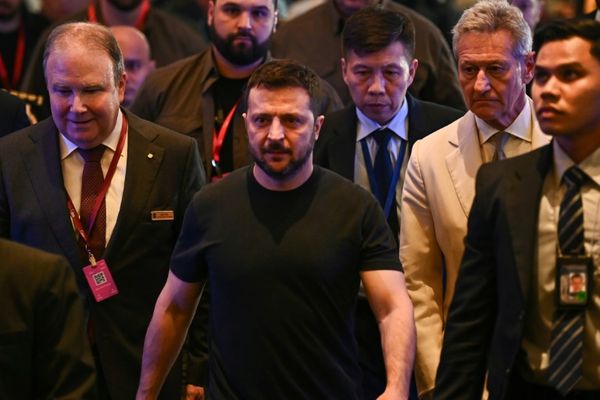
In terms of its content, Mind Over Murder (Sky Crime) is as psyche-shatteringly batshit as any of its many stablemates in the true-crime documentary genre. Formally, it is a thing of precision-engineered beauty.
It could have, should have sprawled, if for no other reason than the number of alleged perpetrators involved. The Beatrice Six, as they came to be known, comprised Joseph White, Thomas Winslow, JoAnn Taylor, James Dean, Debra Shelden and Kathy Gonzalez. The terrible murder of which they were accused and the case built against them nearly 40 years ago are laid out in the first two episodes of this meticulous six-part docuseries by Nanfu Wang.
Helen Wilson, a 68-year-old grandmother, was “the glue that held us all together”, says her grandson Shane, interviewed along with many of her other relatives, all of whom have been repeatedly devastated by her killing and the events that unfolded thereafter. She was raped and murdered in her apartment in Beatrice, Nebraska, in 1985. She had clearly fought for her life. The family got a call that she had died and assumed it was of the pneumonia she had been suffering from. They heard the truth on the car radio as they drove into town. Shane hid under the blanket she had made that was in the back of the car when he heard, so that his brothers wouldn’t see him cry.
There was little evidence for the police to work with, beyond some blood – non-secretor type B – that didn’t match Helen’s. In the days before DNA testing, this didn’t allow them to do much more than eliminate people as they conducted their inquiries.
Former police officer Burt Searcey offered to run a private investigation for the family. He turned up a lead from a woman who said Taylor had confessed that she and White had committed the crime. Using footage from the interviews with Searcey and the police, Wang reconstructs the investigation that led to confessions from Taylor and the others who would be implicated in the murder.
And then, of course, over the next four episodes, comes the peeling back of the layers of apparent truth (which took in reality the next 35 years) to reveal the innocence of the six, how they came to be convicted and exonerated and the real murderer identified.

The frailty – moral, mental, emotional – of humans is everywhere. There are the egos of those in power, be it the police, psychologists or the attorney general, who cannot bear to admit they might have made mistakes – and those who seemingly just don’t care. There is the extraordinary vulnerability and suggestibility of people already battered by life and well-trained in the need to bow to authority to try to avoid extra punishment. There is the desperate need of grieving people for answers. There is the more desperate need for the human mind to find the best way of making sense of the most absurd and awful reality, even if it means agreeing with a psychologist that your dreams about the murder you have been arrested for mean that you must have been there, and just blocked out the memory.
From this toxic mass arise a set of false confessions and a sextet of convictions (only White, less disadvantaged intellectually and socially than the others, insisted on his innocence throughout), despite no DNA or other reliable evidence linking any of them to the crime. A new state attorney comes in and has a team re-examine the case; the interviews Wang conducts with its members and lawyers – who eventually secured the six exonerations and conducted a successful civil suit against the county – make their incredulity clear, along with the fury that their clients seem still too traumatised to express fully.
Wang also tracks the effects on Beatrice itself. How the rumours grew, how the town divided as new doubts and evidence surfaced – and how it still remains conflicted. Most of the inhabitants Wang interviews – a measure of the trust she gained while embedded there – retain some vague sense, handed down through generations now, that the six must have been there even if they didn’t kill the widow Wilson.
To add what seems at first like an unnecessary further layer, the programme-makers have commissioned a play to be performed by the local theatre group, using verbatim dialogue from interview, trial and appeal transcripts. But what seems at first a gimmicky flourish turns out to be an inspired decision. After nearly six hours spent examining how we can warp and ruin lives, the final 20 or 30 minutes offer a measure of hope and a truly moving testimony to what often sounds like a dead phrase, but here is on display as a living, breathing thing: the healing power of art.
Mind Over Murder is available to watch on Sky Crime in the UK and Binge in Australia.







